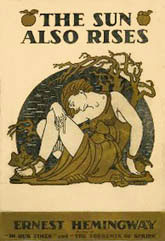The Sun Also Rises
Critique • Quotes
 First edition, 1926
First edition, 1926First publication
1926
Literature form
Novel
Genre
Literary
Writing language
English
Author's country
United States
Length
Approx. 68,000 words
Reading what isn't written
It's an irony that the first successful novel by the writer often accused of being mindlessly ballsy features a hero without a penis. Jake Barnes had it shot off in the war, a tragedy that prevents him and the woman who loves him from getting it on. He still has desire though and he quietly suffers as he watches Brett Ashley attract and destroy other men.
The hero Jake Barnes is a foreign correspondent in Paris after the First World War, part of the "lost generation", so dubbed by Gertrude Stein. As indicated in the quotation from Ecclesiastes which gives the book its title, The Sun Also Rises is meant—at least in part—to answer Stein. However, the jaded heavy-drinking characters with their sardonic dialogue and their search for distraction have tended to reinforce readers' views that this was indeed a lost generation.
Still, one gets the idea Hemingway saw salvation in the characters' return to elemental experiences. Such as the enjoyment of nature, as seen during a fishing expedition that even someone like me, who is usually bored to death by this so-called sport, can find entrancing. Or in the risking of life in the running of the bulls or the struggle for honour in the bullfighting ring itself.
Deceptively offhand
It is all beautifully written. By which I do not mean the prose is pretty. Hemingway's text in his first serious novel is as finely honed as in his first collection of stories, In Our Time, but appears deceptively offhand as delivered first-person by Jake Barnes, easing some of the perceived quirkiness of the early stories.
The Sun Also Rises is an easy, smooth read that every now and then catches you unawares. Here's an example:
Someone asked Georgette to dance, and I went over to the bar. It was really very hot and the accordion music was pleasant in the hot night. I drank a beer, standing in the doorway and getting the cool breath of wind from the street. Two taxis were coming down the steep street. They both stopped in front of the Bal. A crowd of young men, some in jerseys and some in their shirtsleeves, got out. I could see their hands and newly washed, wavy hair in the light from the door. The policeman standing by the door looked at me and smiled. They came in. As they went in, under the light I saw white hands, wavy hair, white faces, grimacing, gesturing, talking. With them was Brett. She looked very lovely and she was very much with them.
One of them saw Georgette and said: "I do declare. There is an actual harlot. I'm going to dance with her, Lett. You watch me."
The tall dark one, called Lett, said: "Don't you be rash."
The wavy blond one answered: "Don't you worry, dear." And with them was Brett.
I was very angry. Somehow they always made me angry. I know they are supposed to be amusing, and you should be tolerant, but I wanted to swing on one, any one, anything to shatter that superior, simpering composure. Instead I walked down the street and had a beer at the next Bal.
So much is going on here, so much that is said so seemingly simply. Or not said at all. This is the first mention of the character named Brett but, without the narrator saying more about her than that she was with a crowd of young men, and then saying it again, you sense immediately this woman is painfully important to him.
The craft of writing raised to the level of magic.
— Eric
Critique • Quotes

